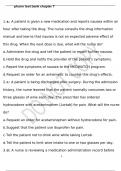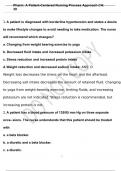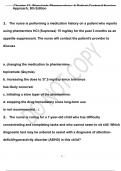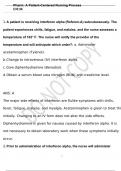Tutorjohn
On this page, you find all documents, package deals, and flashcards offered by seller tutorjohn.
- 26
- 0
- 0
Community
- Followers
- Following
26 items

pharm test bank chapter 7
1. a.: A patient is given a new medication and reports nausea within an hour after taking the drug. The nurse consults the drug information manual and learns that nausea is not an expected adverse effect of this drug. When the next dose is due, what will the nurse do? a. Administer the drug and tell the patient to report further nausea. b. Hold the drug and notify the provider of the patient's symptoms. c. Report the symptoms of nausea to the MEDWATCH program. d. Request an order for an ant...
- Exam (elaborations)
- • 8 pages •
1. a.: A patient is given a new medication and reports nausea within an hour after taking the drug. The nurse consults the drug information manual and learns that nausea is not an expected adverse effect of this drug. When the next dose is due, what will the nurse do? a. Administer the drug and tell the patient to report further nausea. b. Hold the drug and notify the provider of the patient's symptoms. c. Report the symptoms of nausea to the MEDWATCH program. d. Request an order for an ant...

Pharm: A Patient-Centered Nursing Process Approach CH: 39
1. A patient is diagnosed with borderline hypertension and states a desire to make lifestyle changes to avoid needing to take medication. The nurse will recommend which changes? a. Changing from weight bearing exercise to yoga b. Decreased fluid intake and increased potassium intake c. Stress reduction and increased protein intake d. Weight reduction and decreased sodium intake: ANS: D Weight loss decreases the stress on the heart and the afterload. Decreasing salt intake decreases the amou...
- Exam (elaborations)
- • 15 pages •
1. A patient is diagnosed with borderline hypertension and states a desire to make lifestyle changes to avoid needing to take medication. The nurse will recommend which changes? a. Changing from weight bearing exercise to yoga b. Decreased fluid intake and increased potassium intake c. Stress reduction and increased protein intake d. Weight reduction and decreased sodium intake: ANS: D Weight loss decreases the stress on the heart and the afterload. Decreasing salt intake decreases the amou...

Chapter 17: Stimulants Pharmacology: A Patient-Centered Nursing Process
1. The nurse is performing a medication history on a patient who reports using phentermine HCl (Suprenza) 15 mg/day for the past 3 months as an appetite suppressant. The nurse will contact the patient's provider to discuss a. changing the medication to phentermine-topiramate (Qsymia). b. increasing the dose to 37.5 mg/day since tolerance has likely occurred. c. initiating a slow taper of the phentermine. d. stopping the drug immediately since long-term use is not recommended.: c
- Exam (elaborations)
- • 6 pages •
1. The nurse is performing a medication history on a patient who reports using phentermine HCl (Suprenza) 15 mg/day for the past 3 months as an appetite suppressant. The nurse will contact the patient's provider to discuss a. changing the medication to phentermine-topiramate (Qsymia). b. increasing the dose to 37.5 mg/day since tolerance has likely occurred. c. initiating a slow taper of the phentermine. d. stopping the drug immediately since long-term use is not recommended.: c

Pharm: A Patient-Centered Nursing Process CH:34
1. A patient is receiving interferon alpha (Roferon-A) subcutaneously. The patient experiences chills, fatigue, and malaise, and the nurse assesses a temperature of 102° F. The nurse will notify the provider of the temperature and will anticipate which order?: a. Administer acetaminophen (Tylenol). b. Change to intravenous (IV) interferon alpha. c. Give diphenhydramine (Benadryl). d. Obtain a serum blood urea nitrogen (BUN) and creatinine level. ANS: A
- Exam (elaborations)
- • 11 pages •
1. A patient is receiving interferon alpha (Roferon-A) subcutaneously. The patient experiences chills, fatigue, and malaise, and the nurse assesses a temperature of 102° F. The nurse will notify the provider of the temperature and will anticipate which order?: a. Administer acetaminophen (Tylenol). b. Change to intravenous (IV) interferon alpha. c. Give diphenhydramine (Benadryl). d. Obtain a serum blood urea nitrogen (BUN) and creatinine level. ANS: A

McCuistion: Pharmacology: A Patient-Centered Nursing Process Approac
1. What are the two major categories of lower respiratory tract disorders.: - Chronic obstructive pulmonary disease (COPD) and restrictive pulmonary disease 2. COPD is caused by airway obstruction which causes....: increased airway resistance of airflow to lung tissues. 3. causes a decrease in total lung capacity as a result of fluid accumulation or loss of elasticity of the lung.: Restrictive lung disease
- Exam (elaborations)
- • 11 pages •
1. What are the two major categories of lower respiratory tract disorders.: - Chronic obstructive pulmonary disease (COPD) and restrictive pulmonary disease 2. COPD is caused by airway obstruction which causes....: increased airway resistance of airflow to lung tissues. 3. causes a decrease in total lung capacity as a result of fluid accumulation or loss of elasticity of the lung.: Restrictive lung disease

Pharm Chapter 16
1. nurse The nurse is preparing to administer a drug and learns that it is an indi- rect-acting cholinergic agonist. The understands that this drug a. acts on muscarinic receptors. b. acts on nicotinic receptors. c. inhibits cholinesterase. d. inhibits cholinergic receptors.: C Rational: Agents that inhibit cholinesterase, which is the enzyme that destroys acetylcholine, indirectly enhance the actions of acetylcholine.
- Exam (elaborations)
- • 19 pages •
1. nurse The nurse is preparing to administer a drug and learns that it is an indi- rect-acting cholinergic agonist. The understands that this drug a. acts on muscarinic receptors. b. acts on nicotinic receptors. c. inhibits cholinesterase. d. inhibits cholinergic receptors.: C Rational: Agents that inhibit cholinesterase, which is the enzyme that destroys acetylcholine, indirectly enhance the actions of acetylcholine.

Pharmacology Exam One Practice Questions
1. The nurse is caring for a patient who is receiving intravenous theophylline. The patient complains of headache and nausea. The nurse will contact the provider to a. change the medication to an oral theophylline. b. obtain an order for a serum theophylline level. c. request an order for an analgesic medication. d. suggest an alternative methylxanthine medication.: ANS: B Theophylline has a narrow therapeutic index and a risk for severe symptoms with toxic levels. When patients report s...
- Exam (elaborations)
- • 36 pages •
1. The nurse is caring for a patient who is receiving intravenous theophylline. The patient complains of headache and nausea. The nurse will contact the provider to a. change the medication to an oral theophylline. b. obtain an order for a serum theophylline level. c. request an order for an analgesic medication. d. suggest an alternative methylxanthine medication.: ANS: B Theophylline has a narrow therapeutic index and a risk for severe symptoms with toxic levels. When patients report s...

Pharm: A Patient-Centered Nursing Process Approach CH: 40
1. The nurse is caring for a postoperative patient. The nurse will anticipate administering which medication to this patient to help prevent thrombus formation caused by slow venous blood flow? a. Alteplase (Activase) b. Aspirin c. Clopidogrel (Plavix) d. Low-molecular-weight heparin: ANS: D Low-molecular-weight heparin is an anticoagulant, which is used to inhibit clot formation and is used prophylactically to prevent postoperative deep vein throm- bosis. Alteplase is a thrombolytic, which...
- Exam (elaborations)
- • 17 pages •
1. The nurse is caring for a postoperative patient. The nurse will anticipate administering which medication to this patient to help prevent thrombus formation caused by slow venous blood flow? a. Alteplase (Activase) b. Aspirin c. Clopidogrel (Plavix) d. Low-molecular-weight heparin: ANS: D Low-molecular-weight heparin is an anticoagulant, which is used to inhibit clot formation and is used prophylactically to prevent postoperative deep vein throm- bosis. Alteplase is a thrombolytic, which...

Pharmacology- A patient-centered nursing process approach Test 3
1. A patient tells the nurse that he has started to take an OTC antihistamine, diphenhydramine. In teaching about side effects, what is most important for the nurse to tell the patient? A: To avoid insominia, do not take this drug at bedtime. B: Avoid driving a motor vehicle until stabilized on the drug C: Nightmares and nervousness are more likely in an adult D: Medication may cause excessive secretions: B: Avoid driving a motor vehicle until stabilized on the drug 2. A patient complains of...
- Exam (elaborations)
- • 41 pages •
1. A patient tells the nurse that he has started to take an OTC antihistamine, diphenhydramine. In teaching about side effects, what is most important for the nurse to tell the patient? A: To avoid insominia, do not take this drug at bedtime. B: Avoid driving a motor vehicle until stabilized on the drug C: Nightmares and nervousness are more likely in an adult D: Medication may cause excessive secretions: B: Avoid driving a motor vehicle until stabilized on the drug 2. A patient complains of...

Pharmacology: A Patient-Centered Nursing Process Approach: Chapter
1. The nurse in the clinical research setting is knowledgable about ethical principles and protection of human subjects. What principle is demonstrated by ensuring the patient's right to self-determination? a. Beneficence b. Respect for persons c. Justice d. Informed consent: B 2. The research nurse is meeting with a patient and determines, based on the assessment, that the patient meets inclusion criteria for clinical research. The patient agrees to participate in the clinical trial. The ...
- Exam (elaborations)
- • 7 pages •
1. The nurse in the clinical research setting is knowledgable about ethical principles and protection of human subjects. What principle is demonstrated by ensuring the patient's right to self-determination? a. Beneficence b. Respect for persons c. Justice d. Informed consent: B 2. The research nurse is meeting with a patient and determines, based on the assessment, that the patient meets inclusion criteria for clinical research. The patient agrees to participate in the clinical trial. The ...
